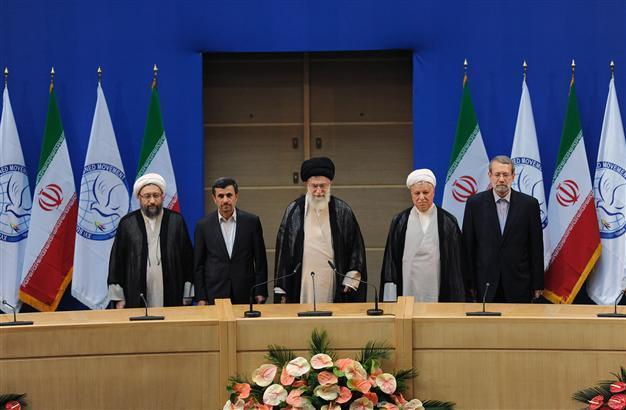Iran 'never seeking nuclear weapons,' leader tells summit
TEHRAN - Agence France Presse

In this photo released by the official website of the Iranian supreme leader's office, supreme leader Ayatollah Ali Khamenei, center, parliament speaker Ali Larijani, right, chief of Expediency Council, Akbar Hashemi Rafsanjani, second right, President Mahmoud Ahmadinejad, second left, and judiciary chief Sadeq Larijani, left, listen to Iran's national anthem, at the opening session of the Nonaligned Movement, NAM, summit, in Tehran, Iran, Thursday, Aug. 30, 2012. AP Photo
Iran is "never seeking nuclear weapons" and will not give up its right to develop nuclear energy, supreme leader Ayatollah Ali Khamenei told a summit of non-aligned countries that opened in Tehran today."I insist that the Islamic Republic of Iran is never seeking nuclear weapons," Khamenei said, rebutting Western and Israeli suspicions his country was engaged in pursuing such a goal.
He called the use of nuclear weapons and other weapons of mass destruction "a major and unforgiveable sin." Khamenei also said that "we will never give up the right to peaceful nuclear energy," underlining Iran's determination to push ahead with its atomic programme.
Addressing Western economic sanctions designed to pressure Iran on the nuclear issue, he said: "Sanctions -- which those who babble call 'paralysing' -- not only do not and will not paralyse us, but have made our steps steadier and elevated our resolve and boosted our confidence in our assessments," he said.
Meanwhile, UN chief Ban Ki-moon urged Iran to comply with UN resolutions demanding it curb its nuclear activities, warning that heightened international rhetoric over the issue risked degenerating into "war."
He said Tehran should build confidence in its nuclear programme by "fully complying with the relevant (UN) Security Council resolutions and thoroughly cooperating with the IAEA." Otherwise, he warned, "a war of words can quickly spiral into a war of violence."
Iran was today to lift the curtain on a summit of non-aligned states it presented as a diplomatic triumph, but the event threatened being upstaged by intensified UN scrutiny of its nuclear programme.
UN chief Ban Ki-moon, in Tehran, spent the eve of the summit telling Iran's supreme leader Ayatollah Ali Khamenei and President Mahmoud Ahmadinejad they needed to provide "concrete" steps to ease the showdown over their country's disputed atomic activities.
Meanwhile, the International Atomic Energy Agency has unveiled the creation of a special Iran "task force" to scrutinise Tehran's nuclear programme and its compliance with UN resolutions -- including those demanding a suspension of uranium enrichment.
Additionally, the latest IAEA report on Iran's nuclear progress was expected to be released within days -- possibly even in the middle of the Tehran summit, according to some sources at the IAEA headquarters in Vienna.
The report is said to highlight expanded enrichment in Iran and suspicions concerning an off-limits military base in Parchin, outside Tehran, where warhead design experiments might have taken place.
Iran, which insists its nuclear programme is exclusively peaceful, was focused on presenting the summit of the 120-member Non-Aligned Movement in Tehran as proof that Western attempts to isolate it had been in vain.
The attendance of some 36 heads of state or government was confirmed, according to organisers, with senior officials filling out the rest of the venue in northern Tehran, which was under a security lockdown.
The two-day forum, bringing together much of the developing world, was expected to renew its efforts to dilute the power of the UN Security Council's permanent members and uphold calls for a Palestinian state.
It was also likely to slam Western sanctions imposed on Iran and a handful of other NAM states -- Cuba, North Korea, Syria and Zimbabwe -- and underline the right of all countries to supervised, peaceful nuclear energy, according to draft documents.
Khamenei was to address the summit, which was to be opened on Thursday by new Egyptian President Mohamed Morsi in a landmark visit to Iran -- the first by an Egyptian leader since Iran's 1979 Islamic revolution.
Ban was also to give a speech, one that could stress the themes he raised with Iran's leadership on Wednesday: the nuclear standoff, human rights and the conflict in Syria.
In his pre-summit meeting with Khamenei, the UN leader called for "concrete steps to address the concerns of the International Atomic Energy Agency and to prove to the world that its nuclear programme is for peaceful purposes," according to his spokesman.
Khamenei, according to his official website, shot back by saying the "defective" United Nations was in thrall to the United States, and accusing the UN nuclear watchdog of "sabotaging" Iran's nuclear progress.
The two also discussed the role Iran could play in quelling the violence raging in Syria, whose regime it staunchly supports.
Tehran accuses the United States, Turkey, Saudi Arabia and Qatar of sustaining the armed revolt in Syria. In return, the United States and the Syrian opposition claim Iran is sending arms and troops to Syria.
















